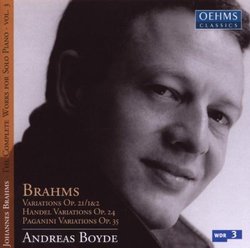| All Artists: Andreas Boyde Title: Brahms: Complete Works for Solo Piano Vol. 3 Members Wishing: 0 Total Copies: 0 Label: Indie Europe/Zoom Original Release Date: 1/1/2009 Re-Release Date: 12/22/2009 Album Type: Import Genre: Classical Style: Number of Discs: 1 SwapaCD Credits: 1 UPC: 4260034865860 |
Search - Andreas Boyde :: Brahms: Complete Works for Solo Piano Vol. 3
 | Andreas Boyde Brahms: Complete Works for Solo Piano Vol. 3 Genre: Classical
|
Larger Image |
CD Details |
CD ReviewsA Pianist of Stature J Scott Morrison | Middlebury VT, USA | 07/01/2010 (5 out of 5 stars) "One begins to wonder why we have so many marvelous recordings by virtually unknown pianists these days. I suppose it's at least partly because it's reasonably easy to get a performance onto CD, but it surely also indicates that we are in a pianistic golden age. As recently as three months ago I hailed a performance of one of the big Brahms variation sets (the Paganini Variations) by a new-to-me pianist, Jura Margulis Berg, Brahms, Beethoven, Bach and now we have another terrific CD by another unknown-to-me pianist, Andreas Boyde, who apparently is recording all the Brahms piano music for Oehms. This CD is labeled Volume 3. Boyde is a fortyish German who early in his career studied with James Gibb at the London Guildhall and was mentored and promoted by one of the great pianists of the late 20th century, Malcolm Frager. He currently lives in London. I don't know if he has concertized in the US, but if I learned that he was going to be playing anywhere near me I would not hesitate to buy tickets. He has a big technique -- necessary equipment for the Brahms Paganini and Handel Variations on this CD -- and he is also a sensitive musician. He is clearly a man with his own ideas and is not diffident about conveying them. Still, these performances are in the mainstream, nothing really outré here. His playing is ardent, expressive and extraordinarily clean.
Brahms's Variations and Fugue on a Theme by Handel, Op. 24, is one of the handful of truly great piano variations works in the literature, right up there with the Goldbergs and the Diabellis. Written when Brahms was twenty-eight, it shows us not only the classicist we know and love, but also the young man's joy in his skills. It is filled seamlessly with Baroque, Classical and Romantic tropes. Strangely in retrospect, he had to struggle to get it published. The theme is taken from Handel's Harpsichord Suite No. 1 in B-flat Major; Brahms owned a first edition of the Suite and clearly adored the work. Still, there is as much Bach (aside from the Theme) as there is Handel in Brahms's Variations. There are twenty-five variations and a huge final fugue that reminds one of the fugue in Beethoven's 'Hammerklavier' Sonata. Boyde's approach is to pay particular attention to the variations in intensity from section to section, to emphasize lightness when possible. Variation 5, after the virtuosic risoluto 6th, in Boyde's hands sounds innocent and the effect is an easing of tension. The somber minor-key Variation 13 sets up the rollicking, light-hearted Vars. 14 & 15, the latter culminating in an exciting climax followed immediately by one of Brahms's most brilliant inventions, the canonic 16th; Boyde makes the most of it. And so it goes. The Fugue is based on the opening of the Handel theme and hewn from granite. Boyde is as effective here as Fleisher in his classic recording, no small praise. There are, of course, many fine recordings of the Handel Variations, among them those of Fleisher, Serkin, Katchen, Kempff. Boyde deserves to be in their company. And he's in modern hybrid SACD sound, a real plus. Even more virtuosic are the Paganini Variations. And if anything Boyde is even better here. Somehow he is able to vary the timbre of his instrument, as in the bell-like sounds in latter part of Book I, something no one else save Michelangeli, Wild and Arrau have done so effectively. All those double octaves, hand-stretching spans, huge leaps and transpositions of register are handled with aplomb. One note: Boyde does not repeat the theme at the beginning of Book II but launches right into its first variation. The CD is filled out (actually they're the first tracks on the disc) by Brahms's two Op. 21 sets of variations, Variations on an Original Theme, and Variations on a Hungarian Song. These are, relative to the Handel and Paganini Variations, minor works but not without interest. And Boyde is excellent here, too. This CD was, for me, an introduction to a pianist whom I will eagerly follow. I've been playing it repeatedly over the last couple of days and can't seem to stop myself! Scott Morrison" |

 Track Listings (12) - Disc #1
Track Listings (12) - Disc #1